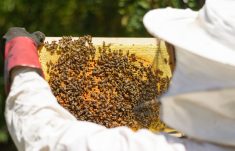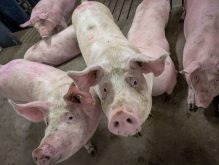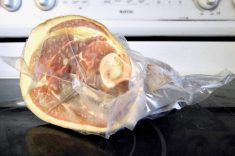Pork groups say a recently upheld U.S. law, which could reduce the flow of Manitoba-born weanlings to the United States, will contribute to breakdowns in an integrated Canada-U.S. market.
If individual states can introduce non-tariff trade barriers, “it will change the fundamental dynamic of how we can handle international trade negotiations,” said Stephen Heckbert, executive director of the Canadian Pork Council.
On May 11, the U.S. Supreme Court upheld California’s Proposition 12, which set new minimum space requirements for sows, laying hens and veal calves. It also banned sales of meat or eggs from animals housed in barns that don’t meet those standards, even if the animals were not raised in California.
Read Also

Trade uncertainty, tariffs weigh on Canadian beef sector as market access shifts
Manitoba’s beef cattle producers heard more about the growing uncertainty they face as U.S. tariffs, and shifting trade opportunities, reshape their market.
The American pork industry challenged the law on the grounds that it impermissibly regulated out-of-state farmers. California imports much of its pork from outside the state.
Why it matters: Beyond the direct trade implications of Prop 12, the court case sets a precedent for state power that pork groups worry could hinder the Canadian industry’s ability to navigate U.S. markets.
Canadian producers exported nearly 6.7 million hogs to the U.S. in 2022, with millions shipped as weanlings from Manitoba.
The Manitoba Pork Council is concerned that local producers will not be able to export weanlings to the U.S. if their barns don’t comply with Prop 12.
“This is something that’s not going to be confined just to California,” said general manager Cam Dahl.
Several other states have similar legislation and were awaiting the Supreme Court decision before putting them into effect, he noted.
“We don’t negotiate separate trade agreements with 50 states. We need to be able to have a North American market that’s integrated, allows for the free flow of product and isn’t different in every different state.”
The viability of these state laws must still be explored through an international trade lens. Heckman said the Canadian government will need to speak with American counterparts.
In March 2022, the CPC joined Mexico and the Illinois Pork Producers in filing an argument supporting an appeal against Prop 12. It noted the integrated nature of the North American pork industry.
“California’s extraterritorial regulation of Mexican and Canadian sow farms would thwart those nations’ own considered choices about how to protect animal welfare,” the joint submission said.
The Canadian Pork Council has already had informal discussion with Canadian trade officials.
Heckman said the door is open for the U.S. National Pork Producers Council (NPPC), the organization at the heart of the recent Supreme Court case, to challenge Prop 12 again. He said he was waiting for a full debrief from American producers to clarify their next move.
In a May 11 statement, NPPC president Scott Hays signaled the group’s intent to keep fighting.
“Allowing state overreach will increase prices for consumers and drive small farms out of business, leading to more consolidation,” said Hays. “We are still evaluating the court’s full opinion to understand all the implications.”
Enforcement of Prop 12 standards for sow housing begins July 1.
When Dahl spoke with the Co-operator on May 15, he said he didn’t know how soon Manitoba producers could expect to feel the effects of the law.
Prop 12 changes
Proposition 12 requires that breeding pigs must be able to turn around freely, lie down, stand up and fully extend their limbs. It stipulates that sows must have at least 24 square feet of floor space, about the size of a double bed. Some exceptions are made, such as the five days prior to farrowing and while the sow is nursing.
The current industry standard is 14 to 20 square feet, according to a 2021 report from Dutch banking and financial services company Rabobank.
In Manitoba, producers must follow the National Farm Animal Care Council’s code of practice if they want to send pigs to federally inspected processing plants.
Those codes require any barns built after 2014 to house sows in groups, with individual stalls allowed for 28 days after breeding. Stalls must allow sows to stand without simultaneously touching both sides, lie down without their udders entering adjacent stalls, stand up without touching the top bars and stand without touching both ends of the stall.
In 2014, the NFACC proposed that all barns be transitioned to open sow housing by 2024. In 2020, after a five-year review, the group proposed to push that deadline back to 2029. The board failed to reach a consensus on that proposal, however, and it has been “temporarily set aside pending NFACC undertaking a full review of its governance processes,” the organization’s website states.
About 60 per cent of sows in Manitoba live in group housing, Dahl said, but they may not meet California’s standards.
Next steps
Earlier this spring, at the Manitoba Pork Council’s annual general meeting, representatives of the Iowa Pork Producers Association and the Minnesota Pork Producers Association told local producers that American farms can probably supply California with enough compliant pork. They said more barns will need to be upgraded if other states apply the same standards.
Seaboard Corp., the third-biggest U.S. pig producer, is prepared to supply California customers with “limited supplies of compliant pork” starting July 1, said company spokesperson David Eaheart.
The firm, which runs Seaboard Foods, converted a portion of its farms and plant operations to meet Prop 12 requirements before the Supreme Court’s decision, Eaheart said.
Pork groups argued that enforcing Prop 12 would lead to higher costs for what has typically been an affordable protein.
In 2018, when the issue was put to a ballot vote in California, voters were told the measure would “likely result in an increase in prices for eggs, pork and veal,” according to the election’s official voter information guide.
The summary of the proposition also warned it would lead to a small reduction in the state’s revenue and would increase oversight costs by up to $10 million annually.
Nearly two-thirds of Californians voted for the proposition, state records show. However, the proposition was passed pre-pandemic and before recent inflation spikes, Heckman said.
















